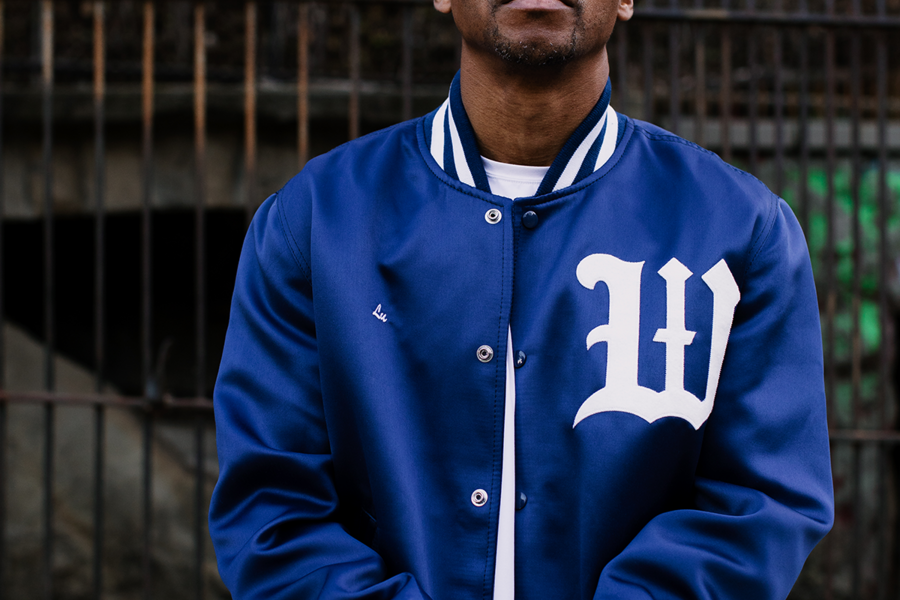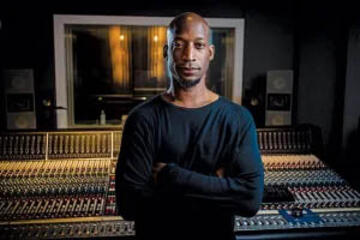Students in the Peabody Institute's new four-year hip-hop program will have the chance to perfect their beats under the tutelage of an industry veteran: Wasalu Muhammad Jaco, perhaps known better by his stage name, Lupe Fiasco.
The Grammy Award-winning rapper will join Peabody as a distinguished visiting professor in the fall, teaching rap to bachelor of music students majoring in Hip Hop. The new degree program, led by renowned producer and musician Wendel Patrick, will follow the one-on-one studio model of a traditional conservatory education, with students taking private lessons and giving public performances. In addition to taking music business and career prep coursework in Peabody's Breakthrough Curriculum, Hip Hop majors will also study the history of hip-hop music and culture; developments in style, technique, and technology; and the genre's influence and social impact.
For Patrick, bringing Lupe Fiasco on board was a no-brainer.
"I first met Lupe in the summer of 2022 when I was finishing up my time as a Nas Fellow at Harvard University and Lupe was beginning his appointment at MIT," he says. "Since that time we have continued to build, consistently, and I'm thrilled to have Lupe joining the Peabody Conservatory as the first new Hip Hop degree hire.
"My aim has always been to bring on board practitioners of the highest level to instruct and guide the students in our program. Not only is Lupe one of the finest, most deftly skilled rap practitioners in the world, he also has a deep commitment to artistic and personal discovery that can serve as a model for what a student artist can strive for in their own professional artistic life. It was very meaningful to see how impactful Lupe's teaching was and the ways in which he engaged with our students when he visited Peabody's campus in the fall of 2023."
Lupe Fiasco's career took off with the release of his 2006 debut album, Lupe Fiasco's Food & Liquor. Nine albums and 12 Grammy nominations later—including a 2008 win for Best Urban/Alternative Performance—he has established himself as one of rap's most innovative voices. His songwriting often blends social criticism with narrative storytelling; his 2024 album Samurai, for example, reimagines the late vocalist Amy Winehouse as a battle rapper and, through a fragmented narrative, explores both her life and the dangers of the entertainment industry. His cerebral, socially conscious music has been recognized with a Saybrook Fellowship at Yale University and a Henry Crown Fellowship at the Aspen Institute.
Teaching isn't a new endeavor for Fiasco. He co-founded the Society of Spoken Art in 2015, a guild that provides upcoming rappers with mentorship and exposure to linguistics, semiotics, and communication theory. He also is an MLK Visiting Professor at MIT, where he teaches a course called Rap Theory and Practice.
The Hub spoke with him to discuss his teaching philosophy and rap's newfound foothold in academia.
Could you speak a little about the classes you're teaching in the fall?
My courses will be rap. I'll be teaching what I do for a living. And from what I understand, it's different from the classes that I teach at MIT, which are more formal, seminar style. These will be more tutorial one-on-one lessons, which I equate to how I do office hours at MIT now. There will also be masterclasses, which will be open to the public and to the campus at large. I'll also be doing other roles outside of teaching people how to rap, like consulting on the program and doing some other things around campus. So it'll be an all-in type [role].
I don't teach hip-hop. I want to be specific about that. I specifically do not teach hip-hop, so it's not a cultural [studies class]. I leave that for the humanities departments. My classes are purely the techniques and skill sets involved with rap. But that requires you having an understanding of the canon from different eras, different rappers, different styles in addition to your own style as you develop it in the course. So [my lessons] will include some of that, but they'll also include some of the things I've learned in the business and just being in the craft.
What will one-on-one lessons in rap look like?
I try to tailor [my teaching style] to the institution. At SOSA, everybody raps already, so it's just a matter of getting really granular about different techniques and then exposing rappers to things outside of rap, like linguistics and communication theory. And then at MIT, you have people who don't know how to rap at all, so there has to be an education in what rap is and practices and programming specific to that level and expectation of students. I'm teaching nuclear physicists and math wizards about rap, so some of it's tailored to take advantage of what MIT has in terms of laboratory space and technology.
Peabody, on the other hand, is a conservatory. The expectation is [that students are] already kind of crushing it. They're not starting from zero. They should know how to freestyle really well, know how to write songs in every genre, and know how to build and create worlds within a song. [Lessons will be] tailored to the specific needs of each student while also challenging them and introducing them to different literary practices—things that are my special sauce as an artist and as a teacher.
Rap and hip-hop studies are relatively new additions to academia. Why are these kinds of programs important?
First off, I learned how to rap in school. At high school, we didn't have a hip-hop department—we were the hip-hop department, the guys and gals in the school who got together and rapped at the end of the day. It was like, hey, this is the verse I wrote last night. Let me kick it and see if I did something dope and get feedback from my fellow rappers. So for me, rap has always been in the academic space.
Then you fast forward to eight or nine years ago, we started SOSA, and it's bringing that same energy back. There's something special about the academic space and creativity. As much as people may think those are two separate worlds, I think that having a scholastic framework around a creative practice gives some kind of standards to it while also giving students a safe place to explore and find different coaches. There's something about being in that space that actually provides a better, more consistent skill set than just learning it ad hoc in the wild.
You mentioned setting standards for teaching. Since there aren't many, if any, conservatories teaching rap right now, you're pioneering and setting the standards for this kind of instruction. What is that like for you?
That was one of the reasons I took the job. This [program] has been cooking for a few years now. Actually, Wendel Patrick has been at Johns Hopkins for a while now [teaching Hip Hop Music Production: History and Practice]. And [when he taught at] other institutes, he was the one who introduced the first courses in hip-hop production. Over the past couple years, he's talked about expanding his course into a proper degree program. When he brought that idea to me—we actually met in Cambridge, where he was at Harvard and I was at MIT—he pitched it and I was like, if you all get it rocking and get it approved by the state of Maryland, I'm down, call me up, I'll be there.
And to your point, to know that it's foundational, one of the most prestigious music conservatories in the world, taking the first step to embrace a full-blooded hip-hop degree, bachelor's degree, I was like, yeah, I can't miss that. Even with the double workload [of teaching at MIT], I needed to be there to be a part of that and help build it.
You mentioned earlier that you expect your students to have familiarity with the rap canon. Who are a few artists that you think anyone who's serious about pursuing rap should listen to?
Aesop Rock, Homeboy Sandman, MF Doom … [their music is] pure technical stylistic concept execution across the whole board. But I also want to give you just flat out nostalgia, so let's include Melle Mel from the Furious Five.
Posted in Arts+Culture









